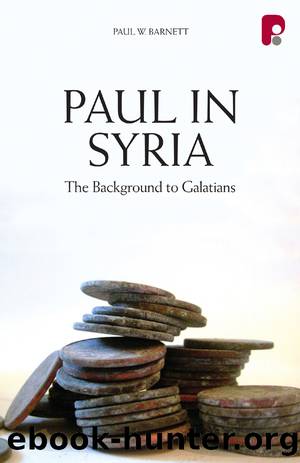Paul in Syria: the Background to Galatians by Barnett Paul;

Author:Barnett, Paul;
Language: eng
Format: epub
Tags: Unknown
Publisher: Authentic Media
Published: 2014-09-15T00:00:00+00:00
Paul had established the relationship between Christ crucified, faith and the Spirit in the immediately prior passage (2:17â21), a relationship he correspondingly applied to the Galatians based on his preaching to them. There is a clear congruence between Paulâs cross-centred experience at Damascus and his cross-centred preaching in the following years.
Since the Damascus experience brought to an end Paulâs dependence on law as the means to access with God it is not surprising that he magnified the faith of Abraham for righteousness and eliminated the role of Moses/law for righteousness. Paul had preached the cross message for the response of faith whereas the âagitatorsâ had proclaimed the necessity of âworks of the lawâ for righteousness. The texts Paul appealed to were consistent with his viewpoint (Gen. 15:6; 12:3; Deut. 27:26; Hab. 2:4; Lev. 18:5; Deut. 21:23).
Paulâs adapted use of these Old Testament (LXX) texts is none too subtle as he continues to argue that it is âof faithâ and not âof works of the lawâ that people find the righteousness of God and the blessings of his Spirit. It is not possible to tell for certain that Paul was employing texts that he had used during his synagogue debates in SyriaâCilicia, but in all likelihood this was indeed where Paul developed this apologetic.
The Two Jerusalems
Slavery is a prominent theme in Galatians occurring as many as twenty times and is specifically connected with âthe present Jerusalemâ, which is (by inference) âthe Jerusalem that is belowâ (Gal. 4:25,26). Pointedly the âslaveryâ in this âJerusalemâ is identified with Mt Sinai (=Moses/law), which in the setting of Galatians is the demand that Gentiles submit to works of the law, including circumcision. The antithetical âfreedomâ in Paulâs âallegoryâ is the redemption from the curse of the law through faith in Christ crucified and the accompanying presence of Christ within, by the power of the Spirit (Gal. 3:13â14; 4:4â6).
The revolutionary element in this paradigm is that both Jews and Gentiles are enslaved. Gentiles are in bondage to gods âthat are by nature not godsâ (Gal. 4:8) and â radically speaking â the historic covenant people are also enslaved. They are enslaved âunder lawâ (Gal. 3:23,25; 4:4). Paul was concerned for the Gentiles in Galatia lest they exchange slavery to the gods for slavery to âworks of the lawâ, specifically male circumcision and the observation of âdays, months, seasons, yearsâ under the Jewish Calendar (Gal. 4:10).
Paulâs exceedingly negative portrayal of âJerusalemâ in Gal. 4:21â31 prompts the question about its identity. Is Jerusalem the wider community of Jews, the circumcision activists or the group associated with the âpillarâ apostles? The general argument of the letter passes a disappointing verdict about James and Peter (Gal. 2:11â14), though it is doubtful that Paul regards them in such a negative term as slave masters. At the same time, it is doubtful that Paul was referring to the wider Jewish community in Jerusalem. Paul makes no reference to them as such in this letter. Thus it appears that Paul had in mind
Download
This site does not store any files on its server. We only index and link to content provided by other sites. Please contact the content providers to delete copyright contents if any and email us, we'll remove relevant links or contents immediately.
Fangirl by Rainbow Rowell(9228)
How to Bang a Billionaire by Alexis Hall(8145)
Wonder by R. J. Palacio(8097)
The Thirst by Nesbo Jo(6932)
The Space Between by Michelle L. Teichman(6927)
Assassin’s Fate by Robin Hobb(6199)
Wiseguy by Nicholas Pileggi(5769)
The Night Circus by Erin Morgenstern(5216)
Paper Towns by Green John(5177)
The Kite Runner by Khaled Hosseini(5168)
Bittersweet (True North #1) by Sarina Bowen(4843)
Gerald's Game by Stephen King(4641)
Too Much and Not the Mood by Durga Chew-Bose(4337)
Pillow Thoughts by Courtney Peppernell(4271)
Goodbye Paradise(3798)
Twelve Days of Christmas by Debbie Macomber(3559)
Good by S. Walden(3548)
The Rosie Effect by Graeme Simsion(3459)
The Cellar by Natasha Preston(3334)
